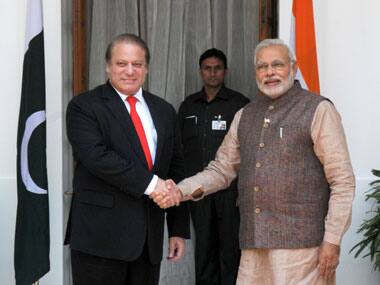Context and common sense become easy victims when cheerleading gets confused with thought-leading. In the times of quick opinions and over the top reactions it is the job of the leader to separate the two and go about his job with a sense of balance and perspective. [caption id=“attachment_1548737” align=“alignleft” width=“380”]  Narendra Modi (right) and Nawaz Sharif discussed 26/11, terrorism in the bilateral meet. PIB[/caption] Did Prime Minister Narendra Modi take his Pakistani counterpart Nawaz Sharif by a collar in a corner of Hyderabad House in Delhi and tell him, “Boss, enough is enough. You ask the terrorists in your country to stop acting against India and do hand us over the 26/11 attackers and their handlers. Or else…?” Forgive the facetiousness but many of the media stories seemed to suggest exactly the above. They ignored the context by choosing to overlook the fact that Sharif was in India on a ceremonial occasion—Modi was statesmanlike while inviting him for the oath-taking and the latter was gracious enough to accept the invite—and harsh talk on such occasions equals discourtesy; and buried common sense by presuming that Pakistan is a weak client state and the Indian prime minister can afford to be condescending towards its leader after inviting him home. ‘Talking tough’ and ‘raising the issue’ have different connotations altogether. At the bilateral meeting, both leaders touched upon contentious issues and by all accounts it was a cordial interaction. Both agreed on the need to engage and continue the dialogue process. There were the usual riders from both sides – terror and 26/11 from Modi’s side and Kashmir from Sharif. If the latter faced some harsh treatment it did not show in his post-meeting utterances. There was no evidence whatsoever for the ’talking tough’ headlines. So was there any reason for using that phrase? Well, yes, there is. It is in sync with the ‘beginning of a new era’ fixation a vocal section has developed after Narendra Modi took over as prime minister. When you interpret the simple reality of a change in government as a life-changing event for the country, you are under compulsion to frame every development that takes place as a completely new beginning, an absolute break from the past. Therefore, where former prime minister Manmohan Singh"raised the issue" of anti-India terror and 26/11 with Islamabad, Modi talked tough on the same – even though it is very likely that the substance of their conversation was the same. Foreign policies of countries are generally based on pragmatic geo-political, security and economic considerations and are generally well thought out. All governments keep the basic template and when shifts happen, they are nuanced, subtle and gradual. India’s foreign policy has followed the same template through the Congress, NDA and UPA days. But now, there’s a near-desperate need to show that the new government is different from the earlier ones. So keeping Modi’s strongman image in mind it has to be ‘tough talk’. If he only ‘raises issues’ he becomes a ‘peacenik’ or ‘dove’ like Manmohan. This kind of language is not about substance, it is about semantics. It is meant for the domestic audience. The Modi myth has been built, and now it has to be sustained. The problem with this dynamic is that it becomes a trap when hype builds foolish expectations in people which in turn puts pressure on the government to take unwise actions. For example, when the media make such a fuss about Modi being a strong, uncompromising leader vis-a-vis Pakistan, how do can they justify it if he conducts himself with restraint when Indian soldiers are attacked on the LoC? Modi is considered to be a pragmatic man, not easily swayed by frivolous considerations. It is not likely that he would be led in his decisions by cheerleaders, but he has to be careful. Public opinion is important but in delicate matters like foreign relations it cannot be allowed to play a big role. He is the prime minister, he cannot make context and common sense irrelevant.
Where Manmohan Singh discusses terrorism with Pakistan, he “raises the issue.” When Modi does the same, the media calls it “talking tough.” But why?
Advertisement
End of Article


)

)
)
)
)
)
)
)
)



